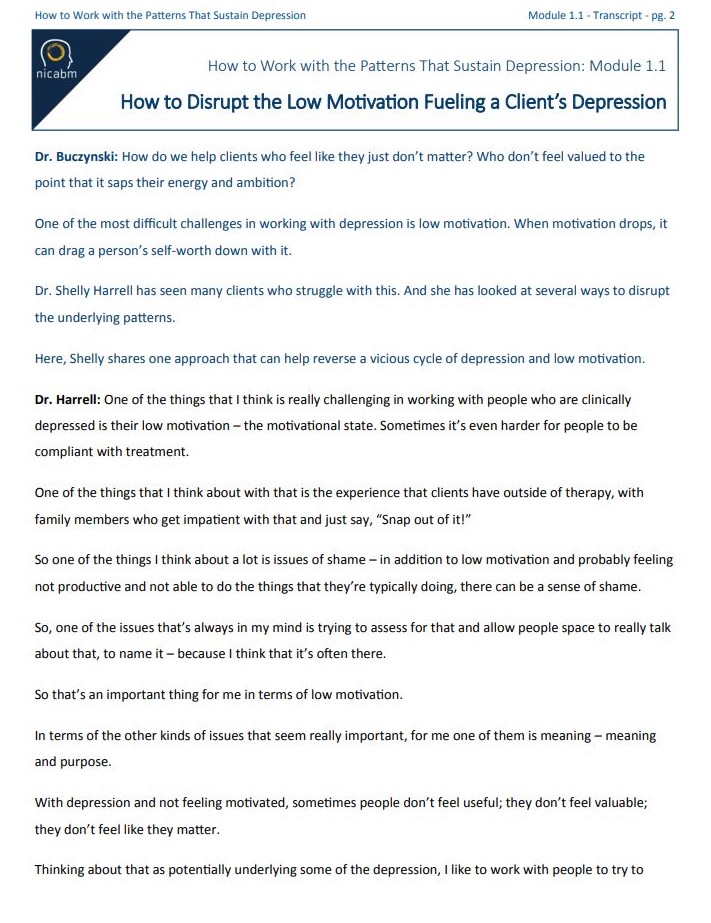Overcoming Barriers to Healing Depression
How to Disrupt the Patterns That Sustain Your Client’s Depression

Depression can overwhelm a client’s life and rob them of meaning, joy and a sense of value.
Left untreated, it can feel like a life sentence – like nothing will ever change.
So to successfully treat depression, we have to look at the issues that sustain it.
First, we have to look at low motivation, because without motivation it’s hard for a client to take any action, and lack of action can often foster feelings of shame.
Beyond that, we also need to break up the two critical thought patterns that can leave clients defenseless against depression’s power.
Trauma also plays a role in depression, and we need to look at the way it can trick the mind into shutdown.
15 top thought leaders shared their personal insights and strategies for working with depression and reducing relapse. We put all their practical ideas together into this program . . .
How to Work with the Patterns That Sustain Depression

How to Work with Toxic Self-Narratives That Sustain Depression
Marsha Linehan, PhD
- A practical depression strategy for working with a client’s feeling of “nobody likes me”
- One way to break the harsh self-narrative that drives a client into depression
- How to help clients escape depression when their critical thoughts are based on a truth

How to Disrupt the Low Motivation Driving a Client’s Depression
Shelly Harrell, PhD Kelly McGonigal, PhD
- Why low motivation can often trap a client in shame
- Two aspects of low motivation that can sustain a client’s depression

Key Strategies to Disrupt Trauma-Driven Depression
Pat Ogden, PhD
- How to target the neurobiological patterns that contribute to a client’s persistent depression
- How to unhook the emotional trigger that sets off a depression response in the body

Critical Skills to Help Clients Avoid Depression Relapse
Christine Padesky, PhD Rick Hanson, PhD Bill O’Hanlon, LMFT
- Why your relapse plan could be the most critical part of therapy
- Two essential antidepressant skills that can significantly reduce depression relapse
- An important part of depression treatment that helps the client know when to activate their relapse plan

How to Break the Depression-Rigid-Thinking Loop
Lynn Lyons, LICSW Kelly McGonigal, PhD Rick Hanson, PhD
- The small language change that can break a client’s rigid depressive thought
- Why some clients with depression are more willing to talk about feelings (and the big reason you might want to avoid doing this)

How to Keep a Client’s Low Motivation From Sabotaging Treatment
Richard Schwartz, PhD Joan Borysenko, PhD
- Two ways depression shows up (and why it’s crucial to work with each one differently)
- The critical first step to prevent a client’s low motivation from sabotaging treatment
- What can go wrong if you focus on a client’s pain before addressing their low motivation

Overcoming Depression After a Major Life Loss
Marsha Linehan, PhD Ron Siegel, PsyD Joan Borysenko, PhD
- How to help clients find effective ways to alter their relationship with depression
- The “grieving pact” that allows clients to suffer while also helping them out of depression

Two Powerful Skills to Reduce a Client’s Depression Risk
Michael Yapko, PhD Kelly McGonigal, PhD
- How to resource clients struggling with depression so they can withstand change
- A common factor in depression treatment that results in higher success rates
- The number one reason a client with depression will leave therapy after the first session

How to Lead a Client Out of Trauma-Induced Depression
Bessel van der Kolk, MD
- A crucial first step for treating clients who are too shut down to feel any motivation
- Why traditional therapy may be ineffective against shutdown patterns linked to depression
Register Here for $197
and get 12 videos, audios, transcripts, plus 3 bonuses to help you work more effectively with a client’s depression
Up to 3.75 CE/CME Credits or Clock Hours are available for purchase at checkout.
Click HERE to get information about CE/CME credits and clock hours as well as speaker disclosures
You Are Protected By
NICABM’s Money-Back Guarantee
We invite you to register for this training program without any risk. Unless you are completely satisfied, we will refund your money. Just let us know within 30 days from the date of registration. We are that confident that you will find this information to be more than you expected.
For This Short Course on How to Work with the Patterns That Sustain Depression, We Brought Together Some of the Top Experts in the Field

Bessel van der Kolk, MD
Neuroscientist and Professor of Psychiatry at Boston University Medical School. Author of The Body Keeps the Score: Brain, Mind, and Body in the Healing of Trauma.

Marsha Linehan, PhD
Creator of Dialectical Behavior Therapy (DBT); Professor of Psychology, Adjunct Professor of Psychiatry and Behavioral Sciences at the University of Washington and Director of the Behavioral Research and Therapy Clinics.

Richard Schwartz, PhD
Founder of Internal Family Systems (IFS) and The Center for Self Leadership; Author of Introduction to Internal Family Systems.

Pat Ogden, PhD
Pioneer in Somatic Psychology; Founder and Director of Sensorimotor Psychotherapy Institute (SPI); Co-founder of the Hakomi Institute; Author of Sensorimotor Psychotherapy: Interventions for Trauma and Attachment.

Shelly Harrell, PhD
Licensed psychologist specializing in multicultural and community psychology; Professor of Psychology in the Graduate School of Education at Pepperdine University.

Dan Siegel, MD
Executive Director of the Mindsight Institute; Co-Director of UCLA’s Mindful Awareness Research Center; author of Mindsight: The New Science of Personal Transformation and The Mindful Therapist: A Clinician’s Guide to Mindsight and Neural Integration.

Rick Hanson, PhD
Senior Fellow of the Greater Good Science Center at UC Berkeley; New York Times bestselling author of Hardwiring Happiness and Buddha’s Brain.

Joan Borysenko, PhD
Founder of Mind/Body Health Sciences LLC; Author of New York Times Bestseller Minding the Body, Mending the Mind.

Ron Siegel, PsyD
Assistant Professor of Psychology, part time, Harvard Medical School; Author of The Mindfulness Solution: Everyday Practices for Everyday Problems and Sitting Together: Essential Skills for Mindfulness-Based Psychotherapy.

Kelly McGonigal, PhD
Health psychologist and lecturer at Stanford University; Author of The Upside of Stress: Why Stress Is Good for You and How to Get Good At It and The Willpower Instinct: How Self-Control Works, Why It Matters, and What You Can Do to Get More of It.

Bill O’Hanlon, LMFT
Co-developer of Solution-Oriented Therapy; Psychotherapist, speaker, and author of Do One Thing Different: Ten Simple Ways to Change Your Life.

Stan Tatkin, PsyD, MFT
Founder of the PACT Training Institute and developer of a Psychobiological Approach to Couple Therapy (PACT).

Terry Real, MSW, LICSW
Founder of the Relational Life Institute; Author of I Don’t Want to Talk About It: Overcoming the Secret Legacy of Male Depression and The New Rules of Marriage: What You Need to Make Love Work.

Christine Padesky, PhD
Co-founder of the Center for Cognitive Therapy in Huntington Beach, California; Co-creator of Strengths-Based CBT; Co-author of Mind Over Mood and Collaborative Case Conceptualization.

Michael Yapko, PhD
Leading expert in clinical hypnosis and treating depression; Clinical psychologist and author of 15 books including his newest books, The Discriminating Therapist and Keys to Unlocking Depression.

Lynn Lyons, LICSW
Author of Anxious Kids, Anxious Parents: 7 Ways to Stop the Worry Cycle and Raise Courageous & Independent Children, clinical social worker and psychotherapist specializing in anxiety in adults and children.

Course Director
Ruth Buczynski, PhD
Here's What You'll Get:
Everything is yours to keep forever in your professional library
|
|
Downloadable videos so you can watch at your convenience, on any device |
|
|
Audio recordings you can download and listen to at home, in the car, at the gym or wherever you like |
|
|
Professionally-formatted transcripts of the sessions, to make review and action simple |
|
|
Three downloadable bonus videos to help you work more effectively with depression |
Get 3 Bonuses That Give You Even More Strategies for Working with a Client’s Depression

Bonus 1
How to Work with the Patterns That Sustain Depression in Couples (When Only One Person is Depressed)
Stan Tatkin, PsyD, MFT Bill O’Hanlon, LMFT Ron Siegel, PsyD
- One simple way for a person to upregulate their partner’s depressed state
- How the prefrontal cortex keeps a client’s brain bound to depression (and how their partner can disrupt it)
- One change to a couple’s sleep pattern that can help relieve depression

Bonus 2
Part 1: The Patterns That Can Turn Depression Dangerous
Christine Padesky, PhD Ron Siegel, PsyD Joan Borysenko, PhD
- One way to help clients determine if they’re suffering from grief or from depression
- An investigation skill to help clients reverse depressed thoughts
- How to shift a client’s rigid beliefs about their life’s value
- How to help clients assess the most devastating belief that powers their depression

Part 2: Working with a Depressed Client Who is Suicidal
Marsha Linehan, PhD
- One technique to disrupt suicidal patterns of thought and help clients focus more on bettering their life
- How to use missing evidence to help clients step back from thoughts of suicide
- How to shift your approach to a client’s depression when they’re considering suicide

Bonus 3
How to Activate a Client’s Support System to Help Them Beat Depression
Shelly Harrell, PhD Terry Real, MSW, LICSW
Joan Borysenko, PhD Rick Hanson, PhD
- The vital ingredient a partner brings to treatment that makes the healing process so powerful
- The fundamental strategy that can help your most challenging clients commit to depression treatment
- How to empower the partner to stand up to their loved one’s depression while motivating them to change
Register Here for $197
and get 12 videos, audios, transcripts, plus 3 bonuses to help you work more effectively with a client’s depression
Up to 3.75 CE/CME Credits or Clock Hours are available for purchase at checkout.
Click HERE to get information about CE/CME credits and clock hours as well as speaker disclosures
You Are Protected By
NICABM’s Money-Back Guarantee
We invite you to register for this training program without any risk. Unless you are completely satisfied, we will refund your money. Just let us know within 30 days from the date of registration. We are that confident that you will find this information to be more than you expected.
Here's What Your Peers Have Experienced In NICABM Programs

. . . I feel so fortunate to have this access to brain power, experience and research synthesis . . .
“When I listen to the experts talk openly about their experience, I feel so fortunate to have this access to brain power, experience and research synthesis on cutting edge issues! I go back to the videos to reinforce things that will assist my clients.”
Mary Logan, Counselor
Ipswich, MA

I benefit, my practice benefits, and most important my clients benefit . . .
“I live in Nova Scotia and have limited travel funds at the university at which I work. The series provided by NICABM gives me the rare opportunity to listen to the leaders in the field. As a result, I learn valuable information that would not otherwise be available to me. I benefit, my practice benefits, and most important my clients benefit from the knowledge and wisdom I gain from the series.”
David Mensink, PhD Counseling Psychology, Psychologist
Halifax, Nova Scotia, Canada

. . . some dare to go the extra journey to research and educate
“These NICABM series keep me afloat, in touch, on track, well trained in my field, and more personally healthy. The best aspect, though, is that I feel validated and comforted knowing that some dare to go the extra journey to research and educate, so I can walk the path to health, and can share with others.”
Mary Corsello-Vilcheck, LCSW
Midlothian, VA
Why the Transcript Is Essential:
- The transcript makes it easy to go back and double check concepts, citations and names that are mentioned
- We put in a table of contents to make it easy for you to find the exact part of the webinar you need
- Having the concepts already written allows you to take notes on how you’re going to use the ideas rather than transcribing the ideas
- Some people simply learn better by reading than by listening or watching
- You will be able to print out and share techniques presented in the session with your patients

“I really liked being able to follow along with the transcripts as I listened…it was nice not to feel like I had to take notes. I really feel like I remember more when I both hear and see at the same time.”
Mary Ellen McNaughton, Masters in Counseling, Psychology Counselor
Kelowna, British Colombia, Canada
You Are Protected By
NICABM’s Money-Back Guarantee
We invite you to register for this training program without any risk. Unless you are completely satisfied, we will refund your money. Just let us know within 30 days from the date of registration. We are that confident that you will find this information to be more than you expected.
Register Here for $197
and get 12 videos, audios, transcripts, plus 3 bonuses to help you work more effectively with a client’s depression
Up to 3.75 CE/CME Credits or Clock Hours are available for purchase at checkout.
Click HERE to get information about CE/CME credits and clock hours as well as speaker disclosures
